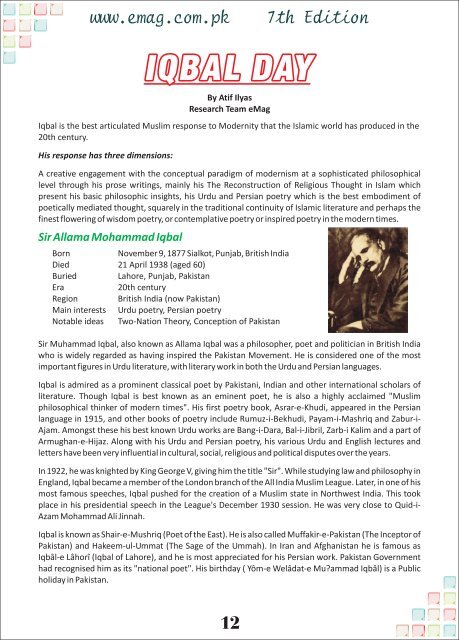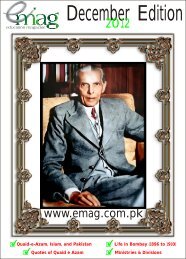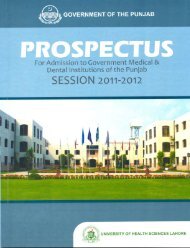You also want an ePaper? Increase the reach of your titles
YUMPU automatically turns print PDFs into web optimized ePapers that Google loves.
www.emag.<strong>com</strong>.<strong>pk</strong><br />
7th Edition<br />
Iqbal is the best articulated Muslim response to Modernity that the Islamic world has produced in the<br />
20th century.<br />
His response has three dimensions:<br />
A creative engagement with the conceptual paradigm of modernism at a sophisticated philosophical<br />
level through his prose writings, mainly his The Reconstruction of Religious Thought in Islam which<br />
present his basic philosophic insights, his Urdu and Persian poetry which is the best embodiment of<br />
poetically mediated thought, squarely in the traditional continuity of Islamic literature and perhaps the<br />
finest flowering of wisdom poetry, or contemplative poetry or inspired poetry in the modern times.<br />
Sir Allama Mohammad Iqbal<br />
IQBAL DAY<br />
By Atif Ilyas<br />
Research Team eMag<br />
Born<br />
November 9, 1877 Sialkot, Punjab, British India<br />
Died 21 April 1938 (aged 60)<br />
Buried Lahore, Punjab, Pakistan<br />
Era<br />
20th century<br />
Region British India (now Pakistan)<br />
Main interests Urdu poetry, Persian poetry<br />
Notable ideas Two-Nation Theory, Conception of Pakistan<br />
Sir Muhammad Iqbal, also known as Allama Iqbal was a philosopher, poet and politician in British India<br />
who is widely regarded as having inspired the Pakistan Movement. He is considered one of the most<br />
important figures in Urdu literature, with literary work in both the Urdu and Persian languages.<br />
Iqbal is admired as a prominent classical poet by Pakistani, Indian and other international scholars of<br />
literature. Though Iqbal is best known as an eminent poet, he is also a highly acclaimed "Muslim<br />
philosophical thinker of modern times". His first poetry book, Asrar-e-Khudi, appeared in the Persian<br />
language in 1915, and other books of poetry include Rumuz-i-Bekhudi, Payam-i-Mashriq and Zabur-i-<br />
Ajam. Amongst these his best known Urdu works are Bang-i-Dara, Bal-i-Jibril, Zarb-i Kalim and a part of<br />
Armughan-e-Hijaz. Along with his Urdu and Persian poetry, his various Urdu and English lectures and<br />
letters have been very influential in cultural, social, religious and political disputes over the years.<br />
In 1922, he was knighted by King George V, giving him the title "Sir". While studying law and philosophy in<br />
England, Iqbal became a member of the London branch of the All India Muslim League. Later, in one of his<br />
most famous speeches, Iqbal pushed for the creation of a Muslim state in Northwest India. This took<br />
place in his presidential speech in the League's December 1930 session. He was very close to Quid-i-<br />
Azam Mohammad Ali Jinnah.<br />
Iqbal is known as Shair-e-Mushriq (Poet of the East). He is also called Muffakir-e-Pakistan (The Inceptor of<br />
Pakistan) and Hakeem-ul-Ummat (The Sage of the Ummah). In Iran and Afghanistan he is famous as<br />
Iqbâl-e Lâhorî (Iqbal of Lahore), and he is most appreciated for his Persian work. Pakistan Government<br />
had recognised him as its "national poet". His birthday ( Yôm-e Welâdat-e Muammad Iqbâl) is a Public<br />
holiday in Pakistan.<br />
12






